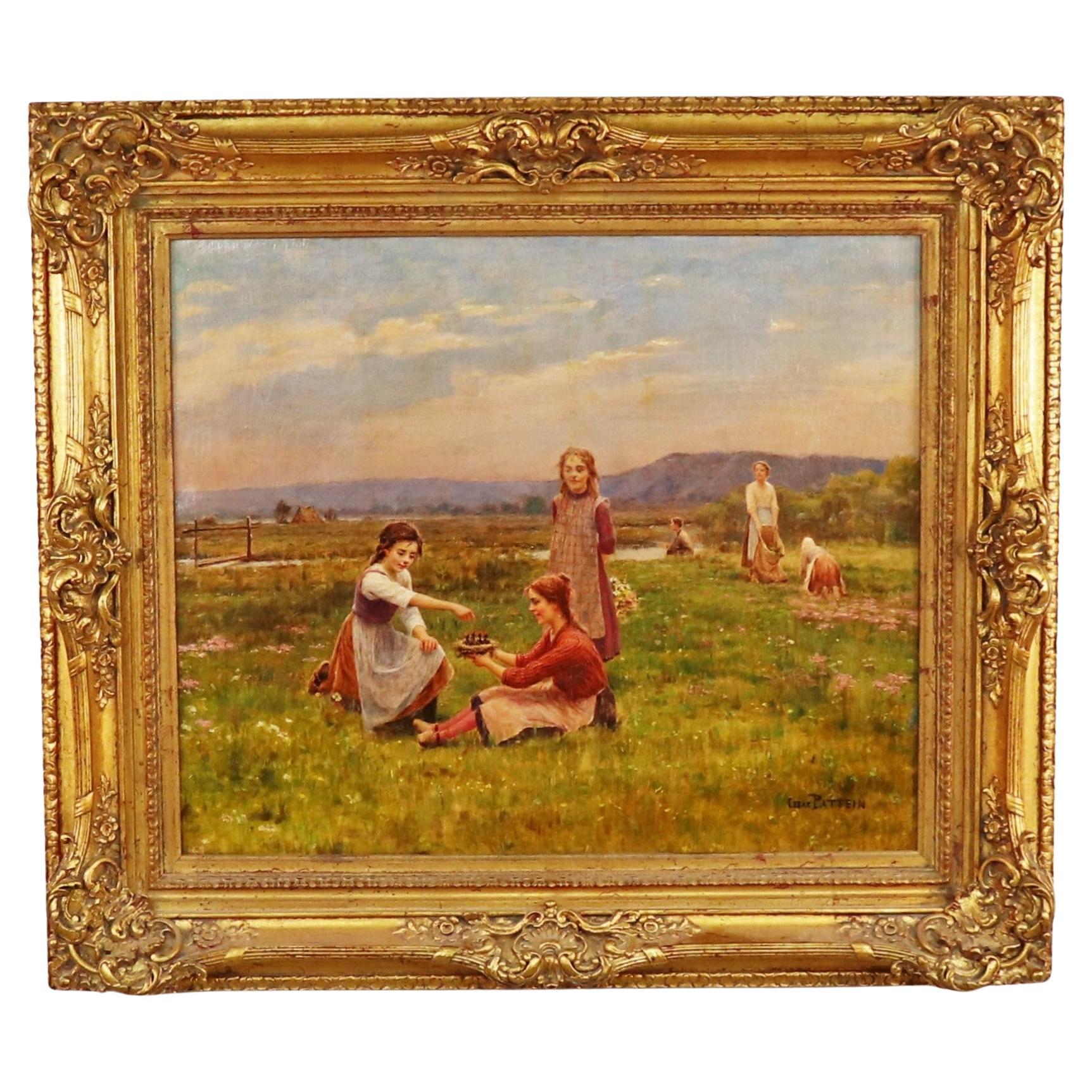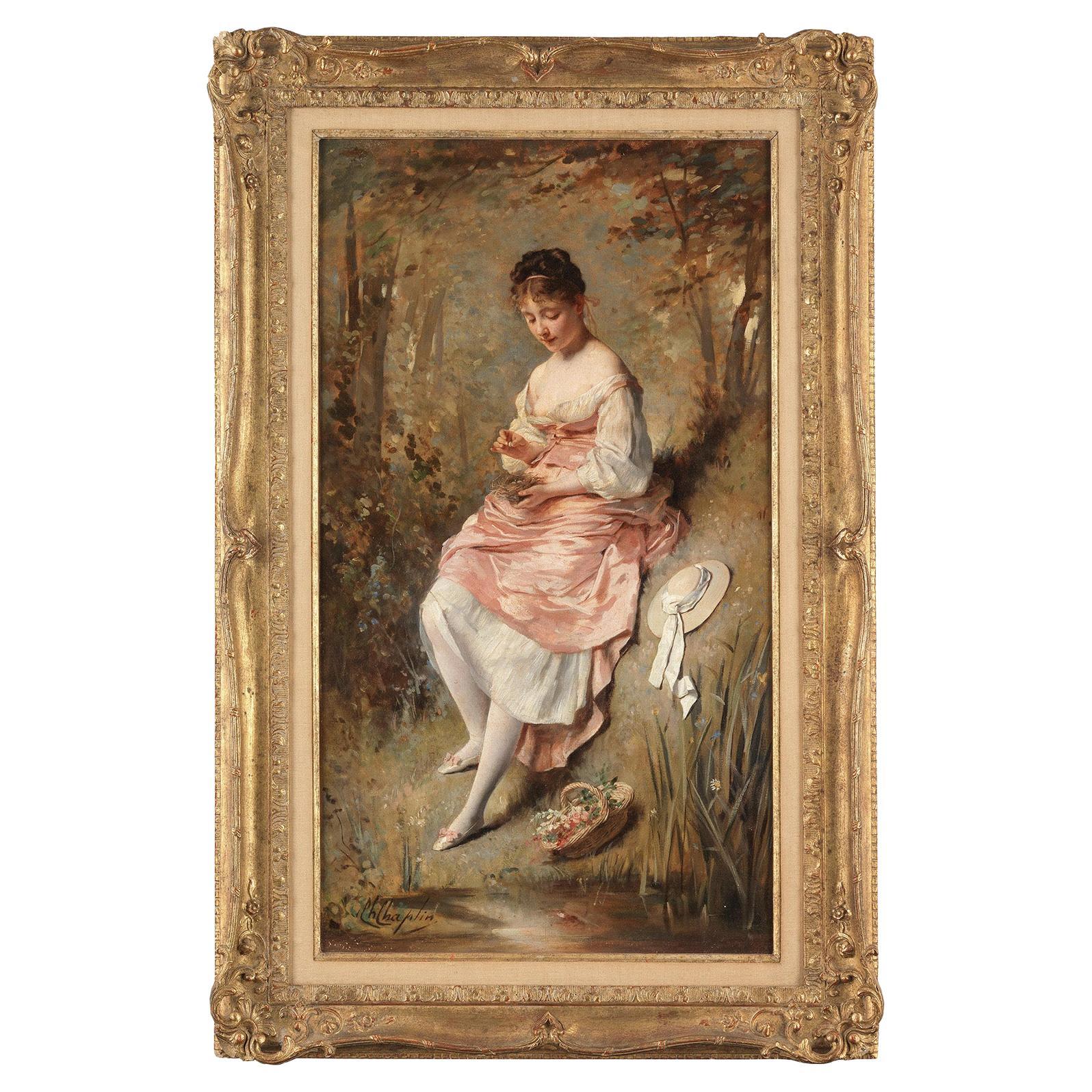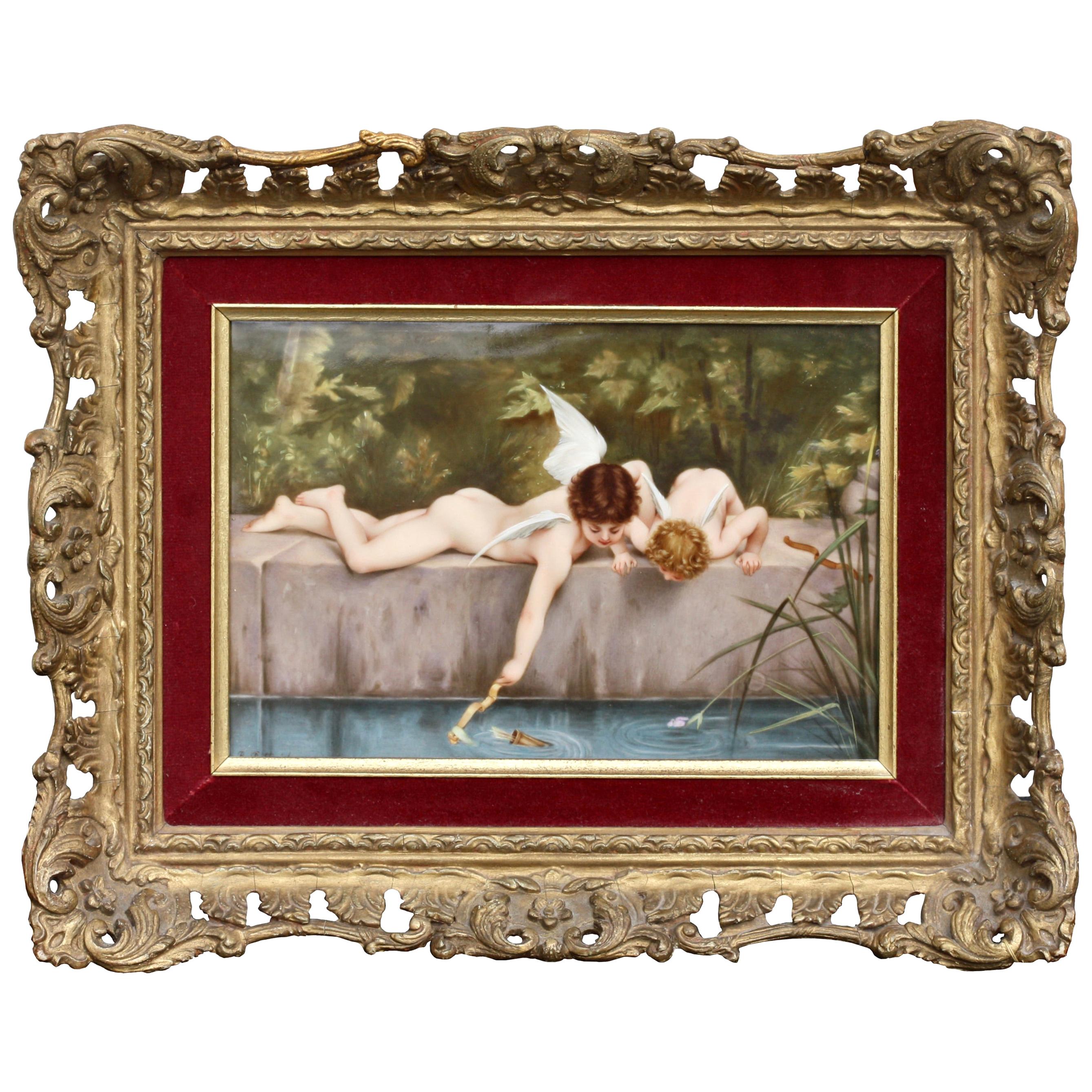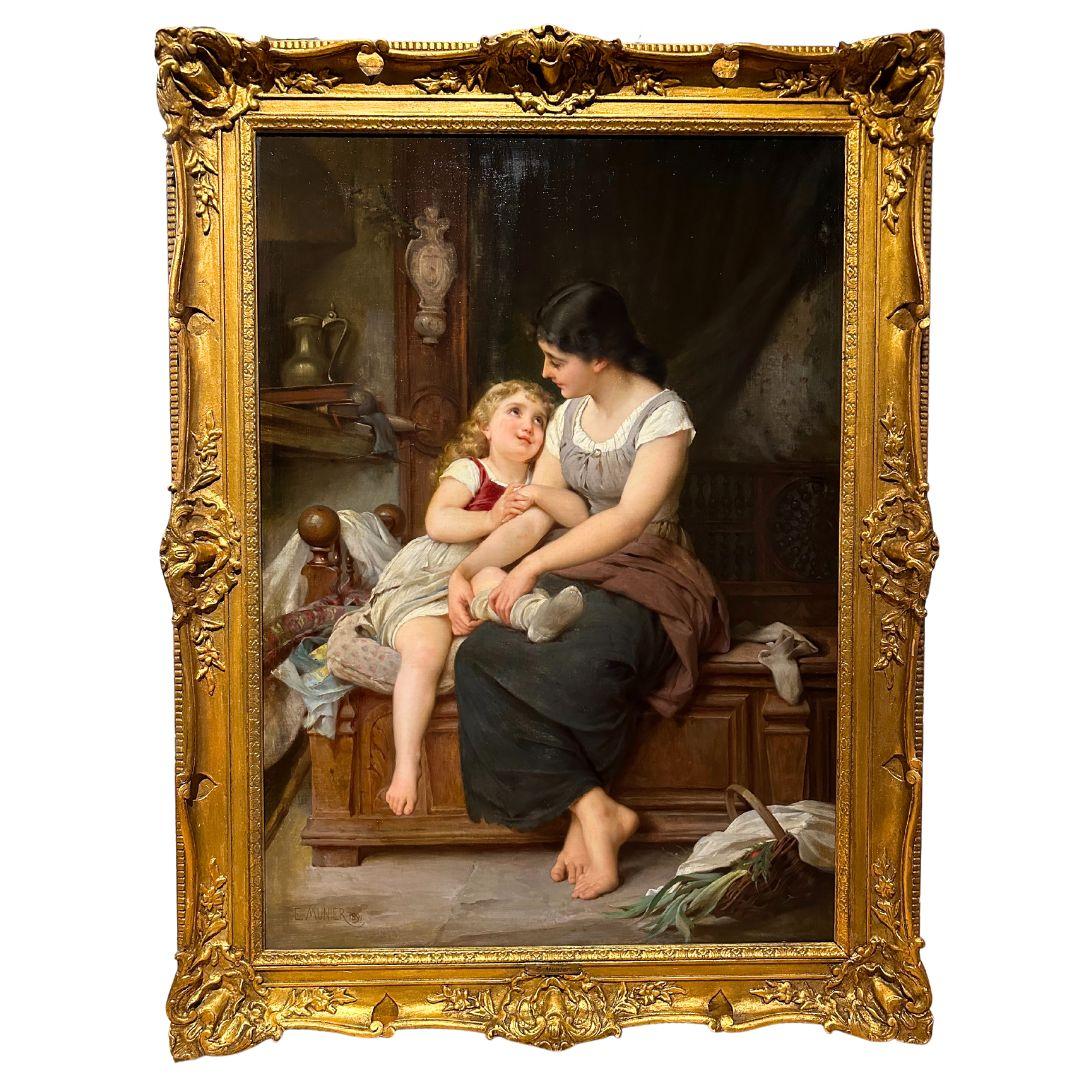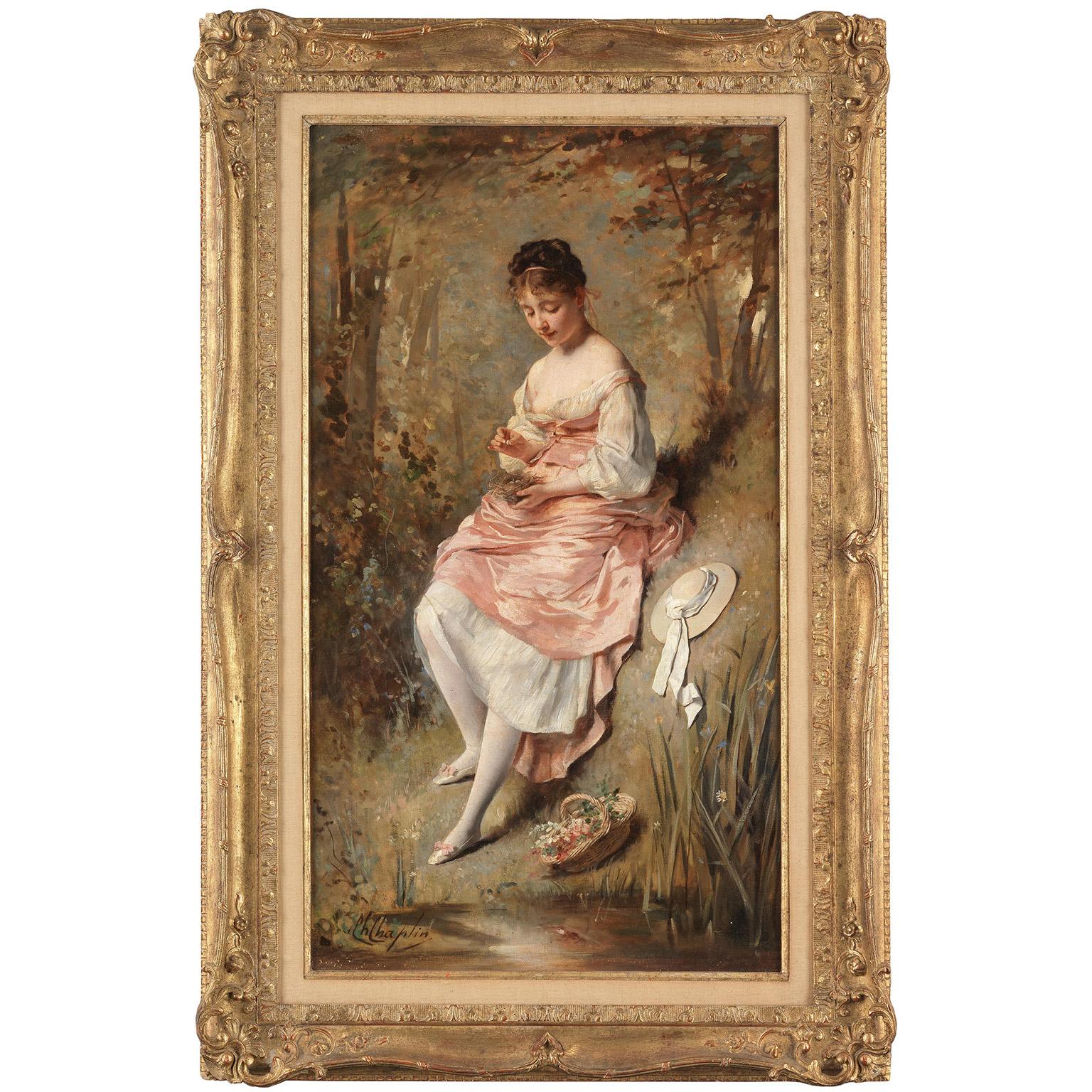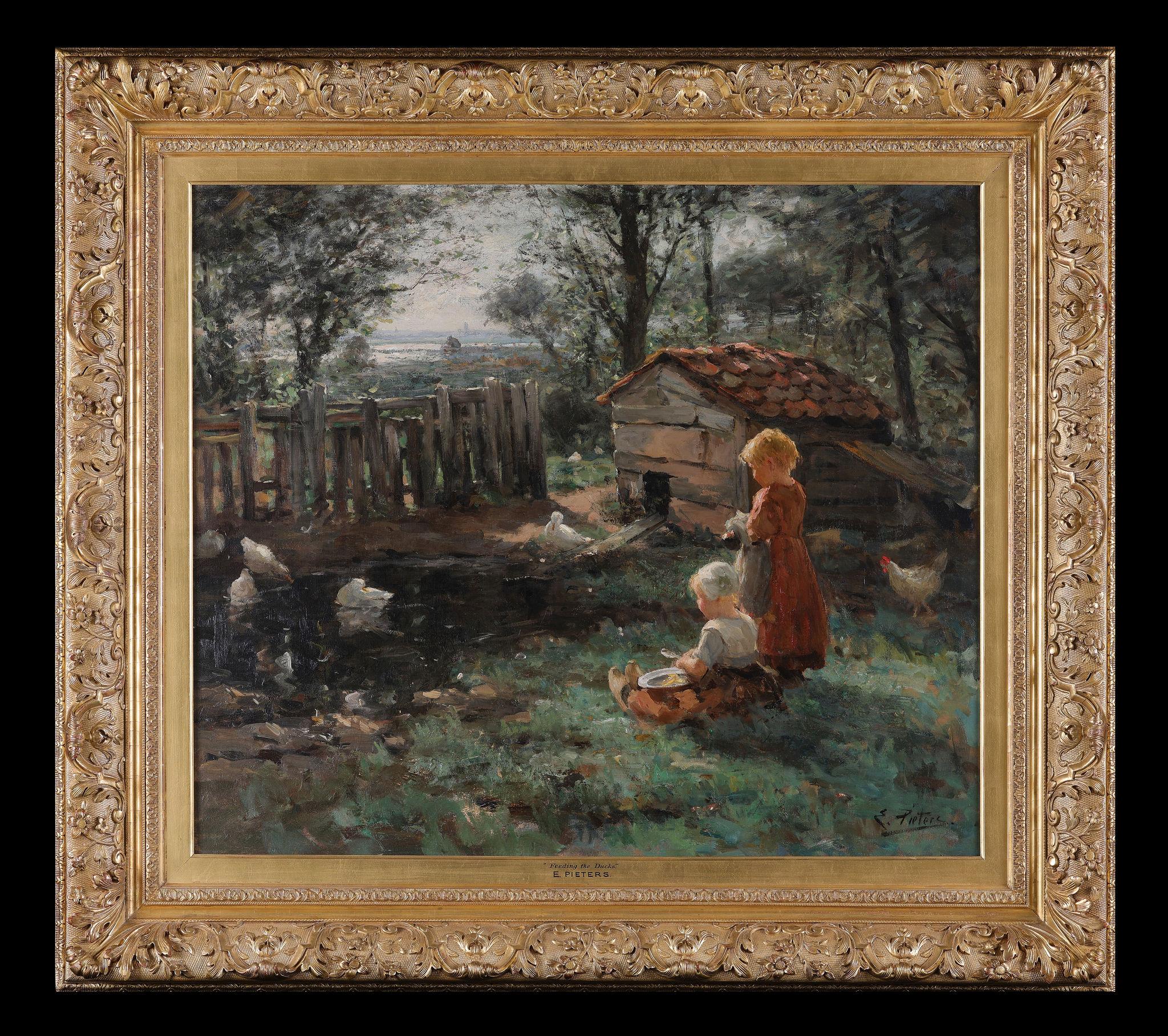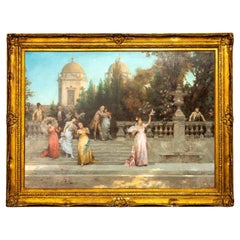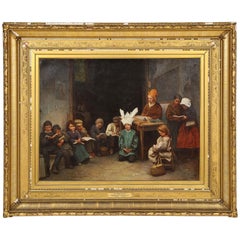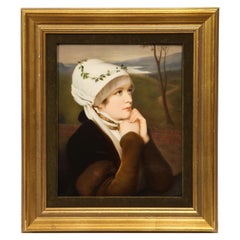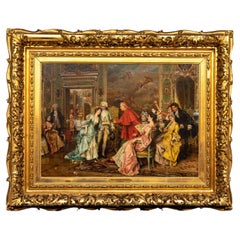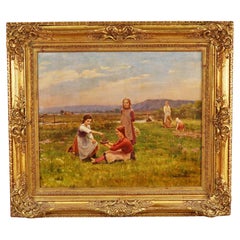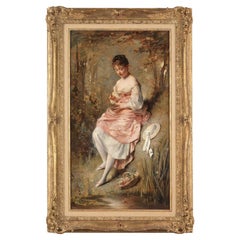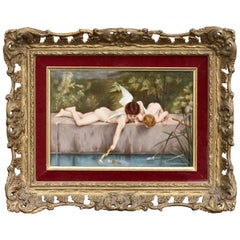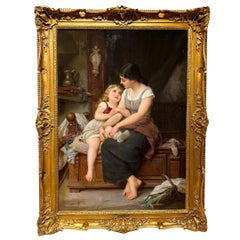Items Similar to Exceptional French Oil on Canvas, "Feeding the Doves", Signed by E. Munier
Want more images or videos?
Request additional images or videos from the seller
1 of 12
Exceptional French Oil on Canvas, "Feeding the Doves", Signed by E. Munier
$148,000
£112,718.06
€129,924.03
CA$207,051
A$232,711.63
CHF 121,190.08
MX$2,830,349.04
NOK 1,550,775.55
SEK 1,470,592.24
DKK 969,667.41
Shipping
Retrieving quote...The 1stDibs Promise:
Authenticity Guarantee,
Money-Back Guarantee,
24-Hour Cancellation
About the Item
An exceptional French oil on canvas, "Feeding the Doves", Signed and Dated by E. Munier, 1890. Émile Munier is one of the most sought after and most talented French artists of the 1800s. His works of art can be found in Stanford University, New Orleans Museum of Art, and many other important institutions and collections. This is one of his masterpieces and a must have for any Munier collection. Exceptionally hand painted in the finest oil paints in the prime of his career. During the 1890s Munier continued to paint peasant, mythological and religious subjects; he also portrayed animals, scenes depicting fishing, landscapes and seascapes. Many of his works featured his children as his models, particularly his daughter. The size and quality of this oil on canvas are second-to-none. Oil on canvases at this size usually depreciate in quality, however, Munier is an expert artist and his works of art are always extremely life-like and painted with exceptional care and perfection. The painting is found in its original perfect condition giltwood frame, all hand carved and finished in 24-karat gold.
France, 1890.
- Creator:Emile Munier (Artist)
- Dimensions:Height: 37 in (93.98 cm)Width: 24 in (60.96 cm)Depth: 3 in (7.62 cm)
- Style:Belle Époque (Of the Period)
- Materials and Techniques:
- Place of Origin:
- Period:
- Date of Manufacture:1890
- Condition:Wear consistent with age and use.
- Seller Location:New York, NY
- Reference Number:1stDibs: LU919521540352
About the Seller
4.9
Platinum Seller
Premium sellers with a 4.7+ rating and 24-hour response times
Established in 1820
1stDibs seller since 2011
191 sales on 1stDibs
Typical response time: <1 hour
- ShippingRetrieving quote...Shipping from: New York, NY
- Return Policy
Authenticity Guarantee
In the unlikely event there’s an issue with an item’s authenticity, contact us within 1 year for a full refund. DetailsMoney-Back Guarantee
If your item is not as described, is damaged in transit, or does not arrive, contact us within 7 days for a full refund. Details24-Hour Cancellation
You have a 24-hour grace period in which to reconsider your purchase, with no questions asked.Vetted Professional Sellers
Our world-class sellers must adhere to strict standards for service and quality, maintaining the integrity of our listings.Price-Match Guarantee
If you find that a seller listed the same item for a lower price elsewhere, we’ll match it.Trusted Global Delivery
Our best-in-class carrier network provides specialized shipping options worldwide, including custom delivery.More From This Seller
View All19th C. Italian Oil on Canvas Painting, 'Departure of the Guests', F. Beda
By Francesco Beda
Located in New York, NY
A Very Large and Quite Impressive 19th C. Italian Oil on Canvas Painting, 'Departure of the Guests', F. Beda. The oil painting Departure of the Guests, signed by Francesco Beda, capt...
Category
Antique 1870s Italian Rococo Paintings
Materials
Canvas, Giltwood
"A Village School" American Oil on Canvas, Kids in Class, Constant Mayer, 1871
Located in New York, NY
A beautiful American oil on canvas school room scene with a teacher instructing students who are seated on benches and on the ground, with one student who appears to be wearing a dun...
Category
Antique 1870s American American Classical Paintings
Materials
Canvas
Large Antique KPM Hand Painted Plaque of Young Beauty Symbolizing Victory
By Königliche Porzellan-Manufaktur (KPM)
Located in New York, NY
A large antique 19th century Belle Époque style KPM hand painted plaque of a young German woman wearing a bay laurel wreath, impressed KPM and scepter...
Category
Antique 1870s German Belle Époque Paintings
Materials
Porcelain
A 19th C. Italian Oil on Canvas "The Cardinal's Present" by Arturo Ricci
By Arturo Ricci
Located in New York, NY
A Marvelous 19th Century Italian Oil on Canvas titled "The Cardinal's Present" by Arturo Ricci. This oil on canvas is truly incredible and one of Ricci's best works of art. The sce...
Category
Antique 1880s Italian Louis XVI Paintings
Materials
Canvas, Wood
19th C. KPM Porcelain Plaque (Painting), Gabriel Metsu’s ‘Lovers at Breakfast"
By Königliche Porzellan-Manufaktur (KPM)
Located in New York, NY
A Rare and Fine Quality Antique 19th Century KPM Painting on Porcelain Plaque after Gabriel Metsu’s ‘Lovers at Breakfast’ (Dated 1661), Metsu with his wife Isabella de Wolff in a Tav...
Category
Antique 1850s German Baroque Decorative Art
Materials
Porcelain, Giltwood
19 C. Orientalist Oil on Canvas 'Prince and Princess in the Harem" Antonio Rivas
By Antonio Rivas
Located in New York, NY
An Incredible 19th Century Orientalist Oil on Canvas 'Prince and Princess in the Harem" signed by Antonio Rivas. Antonio Rivas (1845–1911) was a Spanish painter active in Rome, know...
Category
Antique 1890s Spanish Moorish Paintings
Materials
Canvas, Giltwood
$42,080 Sale Price
20% Off
You May Also Like
Oil on Canvas "Feeding the Birds" by César Pattein ( French 1850 - 1931)
By Jean François Millet
Located in Chicago, IL
César Pattein (French 1850-1931, most Active 1882-1914). Born in Steenvoorde, in northern France, Pattein was raised among farmers and maintained a close connection to the rural regi...
Category
Antique Late 19th Century French Barbizon School Paintings
Materials
Canvas, Giltwood
Charles Joshua Chaplin 'French, 1825-1891' 'Girl with Bird's Nest' Oil on Canvas
By Charles Joshua Chaplin
Located in Los Angeles, CA
Charles Joshua Chaplin (French, 1825-1891) 'The Bird's Nest' A very fine and charming Rococo revival style oil on canvas depicting a young girl, dressed in 18th century costume and r...
Category
Antique 19th Century French Rococo Revival Paintings
Materials
Canvas, Giltwood
After Émile Munier '1810-Circa 1895' 'Fischend Amor' ‘K.P.M.’ Porcelain
By Emile Munier
Located in West Palm Beach, FL
After Émile Munier (1810-circa 1895)
'Fischend Amor'
A Berlin (K.P.M.) Porcelain plaque, circa 1880
painted with cupid and another putto using his bow to fish his quiver of arrows...
Category
Antique 1880s Drawings
Materials
Porcelain
"Mom in Love" 19th Century Academic Realistic French Oil Painting on Canvas
By Emile Munier
Located in Jacksonville, FL
Émile Munier, a French academic artist born in 1840, was renowned for his exquisite depictions of children and domestic scenes during the late 19th century. "Mom in Love," a masterpi...
Category
19th Century Realist Figurative Paintings
Materials
Oil
A Fine French 19th Century Oil on Canvas 'A Young Girl Holding a Bird's Nest'
By Charles Joshua Chaplin
Located in LA, CA
Charles Joshua Chaplin (French, 1825-1891) 'The Bird's Nest' A very fine and charming Rococo revival style oil on canvas depicting a young girl, dressed in 18th century costume and resting by a river bank, holding a bird's nest and one of the tiny eggs. Her bonnet resting to her side and a wicker basket full of hand-picked flowers by her feet; within a later giltwood carved frame. Signed: ChChaplin (lower left). Circa: 1870-1880.
Canvas Height: 31 1/2 inches (80 cm)
Canvas Width: 17 15/16 inches (45.5 cm)
Frame Height: 38 5/8 inches (98 cm)
Frame Width: 24 3/4 inches (63 cm)
Frame Depth: 2 3/8 inches (6 cm)
Charles Joshua Chaplin (8 June 1825 – 30 January 1891) was a French painter and printmaker who painted both landscapes and portraits. He worked in techniques such as pastels, lithography, watercolor, chalk, oil painting and etching. He was best known for his elegant portraits of young women.
Chaplin was born on 8 June 1825 in Les Andelys, Eure, France. His mother, Olympia Adelle Moisy, was French, whereas his father, John Chaplin, was an art broker from England. Charles Chaplin spent his whole life in France, becoming a naturalized citizen in 1886. He studied at the École des Beaux-Arts in Paris from 1840, and he took private lessons in the studio of Michel Martin Drolling, whose apprentices included Paul Baudry, Jules Breton and Jean-Jacques Henner. Later he also taught at the École des Beaux-Arts.
In 1845, he entered the Paris Salon, the official art exhibition of the Académie des Beaux-Arts, as a portrait and landscape painter with the painting Portrait of the Artist's Mother. Chaplin conducted art classes specifically for women at his studio, including Marie Joséphine Nicolas. The American artist Mary Cassatt, the French artist Louise Abbéma and the English artist Louise Jopling were among Chaplin's students. His son Arthur Chaplin was also a painter.
Early Work:
Chaplin made his debut at the Salon with portraits, but he also painted landscapes, particularly the countryside of Auvergne. His early works, from 1848 to 1851, were painted in a manner characterized by an interest in realism, a style established in the French Second Republic, that had the motto Liberté, égalité, fraternité, and was ruled for three years by the republican government of France from the 1848 Revolution until the 1851 coup by Louis-Napoléon Bonaparte. Realism was an artistic movement that began in France in the 1850s, after the 1848 Revolution. From the late 18th century Romanticism dominated French art and literature but was spurned by Realists, who revolted against the display of the emotions of the Romantic movement, seeking to depict real and characteristic contemporary individuals and situations with truth and accuracy.
Chaplin painted many works in his early days, including floral studies that were displayed at the Salon de las Flores. Later, in the late 1850s, he abandoned naturalism, his earlier style, exchanging it for a more graceful, elegant and supple technique that brought him a certain notoriety in France during his time as a portrait painter; as such he embraced the idyllic and voluptuous and fashionable style of the prominent French painter, François Boucher (1703–1770).
He also embraced the tradition of the great English portraitists and developed his very own style of painting but was inspired by the British painters Joshua Reynolds and Thomas Gainsborough. He used to engrave the works of the Dutch artist Pieter Paul Rubens and gained further influence from his work.
Later Work:
Gradually the muddy colours used by Chaplin transformed into white, grey and pink, depicting his models with an opalescent, mother-of-pearl complexion by applying a subtle palette of rosy flesh tones and light greys. After painting portraits and trying his skills on ornamental painting, Chaplin took up genre painting in the 1850s. His favourite subjects are the feminine grace of a young woman's everyday life. He portrays women in several poses: resting; grooming; singing; and reading. He captures them with lightness and carelessness and accentuates the decorative elements of the composition.
Empress Eugénie, the wife of Napoleon III and an admirer of the "Pompadour style", rapidly fell under the enchantment of the painter's neo-Rococo works. Chaplin was among Napoleon III and Empress Eugénie's favourite court artists. In 1859, when his portrait of Aurora was banned by the judges of the Salon as "too erotically suggestive", Napoléon III defended Chaplin and overturned the disqualification order. He was similarly valued as an interior decorator and was appointed to remodel the decor of Empress Eugénie's rooms.
His sensual portraits of women and young girls, often with models posed erotically in hazy surroundings and frequently wearing transparent clothing, attracted the interest of the high society and aristocracy of Paris during the French Third Republic (1870–1940) guaranteeing his success and wealth. He was one of the most popular painters of his time, but nowadays his work is almost unknown, in spite of the fact that his works hang in many major museums around the world.
He employed his Rococo style for his mythological scenes and genre scenes paintings. His genre pictures formed a significant part of his work. In 1861, working as a decorative painter. Chaplin painted the doors and several glass panels above them of the Salon des Fleurs in the Tuileries Palace. The Palace was gutted by fire in 1871 and its ruins swiftly demolished.[9] He also undertook decorating work in the Salon de l’Hémicycle of the Palais de l’Elysée.
Honours and awards:
As a member of the Académie royale de peinture et de sculpture, Chaplin exhibited his paintings at the Paris Salon, the official exhibition venue of members' work. He began exhibiting his paintings at the French Artists' Salon in 1845 and was represented there habitually each year. These exhibitions made him one of France's most famous portrait artists. Commencing in 1847, his work was exhibited regularly at the Royal Academy in London.
During his lifetime, he received acclamation for his artistic talents by the award of several medals: a third class medal in 1851; a second class medal the following year; and an Honour Medal...
Category
19th Century Academic Figurative Paintings
Materials
Oil
'Feeding the Ducks' an antique oil painting
By Evert Pieters
Located in St. Albans, GB
This painting is in excellent condition having been behind glass until recently. The colours are preserved and the canvas is blemish free.
Artwork Size: 30 x 36" (76 x 91cm)
Artwor...
Category
Late 19th Century Dutch School Landscape Paintings
Materials
Oil
More Ways To Browse
Munier Emile
Lars Bertle
Par Lindblad
Peru Cuzco School Painting
Radha Krishna Antique Painting
Reverse Glass Painting Of Horses
Spanish Colonial Oil Painting Archangel
Used Furniture Lakeland
Vintage Furniture Winnipeg
Yarrow Jones
Bogart Bram
Colonial Cuzco Paintings
Ernest Yarrow Jones
Eugene Verboeckhoven
Frank Lloyd Wright Price Tower
Georgetown Galleries Furniture
Hans Osswald
Kay Frank
